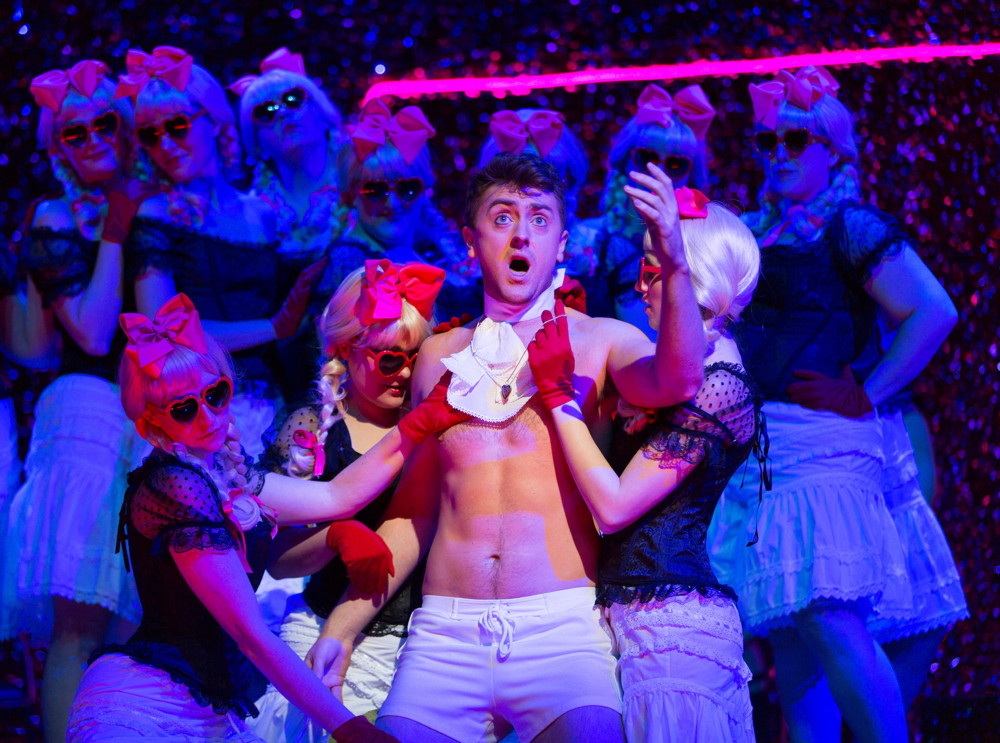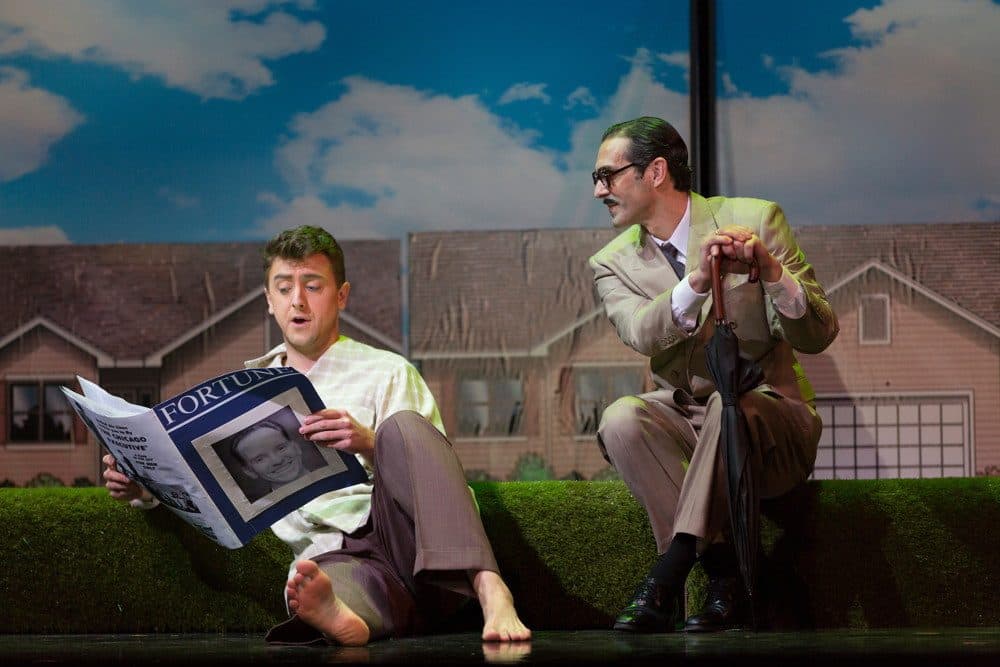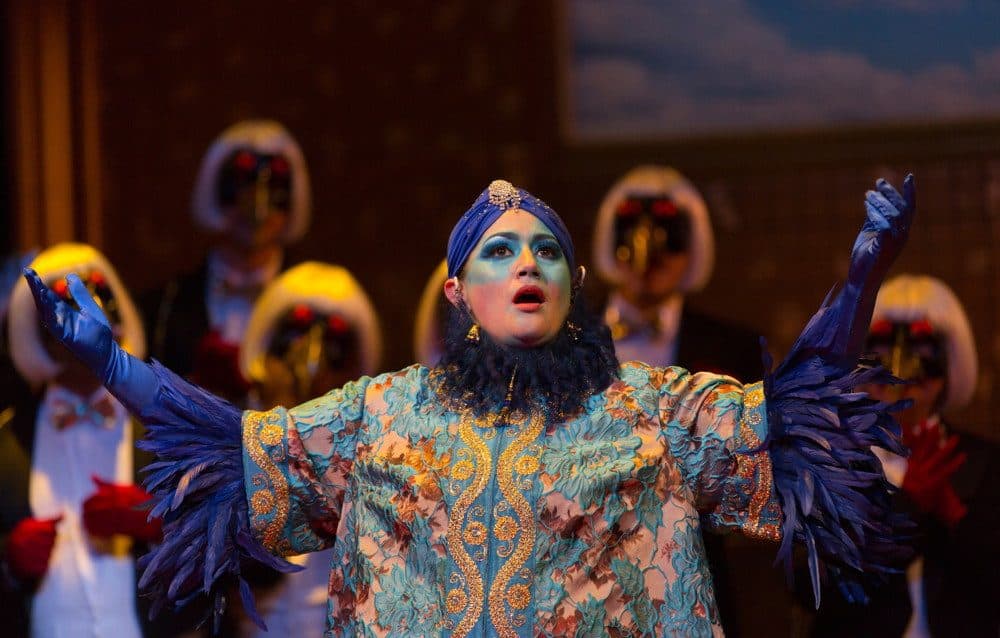Advertisement
Review
Oh, Igor, You're A Character: Boston Lyric Opera’s 'The Rake’s Progress' Savors Stravinsky

Sometimes you like an idea too much. Even a good one.
The Boston Lyric Opera (BLO) has an idea about Stravinsky: The composer was obsessed with success. And the BLO inserted him as a character in his very own opera to prove it.
Stravinsky’s “The Rake’s Progress,” onstage through March 19 in a showy production at the Emerson Cutler Majestic Theatre, traces the steep downward trending “progress” of young Tom Rakewell. A country boy with a simple mind but a promising engagement to a nice young girl, he falls in with the devious Nick Shadow, ventures to the big city, ends up married to a bearded lady and loses his mind.
The BLO production is a winner by almost all accounts. The voices — Anya Matanovic (Anne), Ben Bliss (Tom), Kevin Burdette (Shadow), Heather Johnson (Baba the bearded woman) — are all first-rate, with palettes perfectly suited to their roles. Conductor David Angus worked marvels in the pit with Stravinsky’s chamber-proportioned score. The staging gleamed with style. Costumes had personality.

Yet there was Stravinsky. Silent Yury Yanowsky portrayed the stylish conductor, a wandering presence onstage throughout most of the opera. The notion was inspired, but essentially got overdone. It was a distraction from the inherent beauties in the score, the libretto (W.H Auden, Chester Kallman) and this terrific cast.
It was an appropriate notion for two reasons: The opera — part magical fantasy, part sad coming-of-age, mostly genuine emotion — almost begs for a meta-treatment. And Stravinsky himself, composing “Rake’s” late in life (in 1951, in his 60s), was indeed concerned with some of the same things that precipitate Tom’s fall — the foibles of fame and glamour, the illusion of wealth, the elusive search for public approval.
Too much of the great notion made for the problem. Say a smart thing once, you sound smart. Say it twice, you’re repeating yourself. Say it more than that — hey, we got it the first time.
Given that, there was still so much to love about this production. Directed by Allegra Libonati, with sets by Julia Noulin-Mérat, costumes by John Conklin and Neil Fortin, and lighting by Mark Stanley, the stage sparkled with attractions. Costuming above all: The chorus, alternately bringing to life London’s lusty underground, its unruly paparazzi, and the misfortunate denizens of Bedlam, was dressed imaginatively. Describing them falls short: dwarves in lederhosen and leather jackets? Naughty Hello Kitty outfits? It was a lot of fun to look at, and they sang and acted with great spirit as well.

Angus did work wonders with the gorgeous score. It was largely chamber music, anchored in many moments by the harpsichord colorings of Maja Tremiszewska. Frequently, the contrapuntal layering in the instruments created a luscious difference between the simple, lyrical directness of the vocal lines.
The vocal setting was a world to itself. This is genuinely opera: arias, recits, duets and trios, even some coloratura. There were times it sounded like Mozart. Yanowsky’s self-absorbed hand-wringing onstage belied the fact that the composer of this music was supremely assured, deeply immersed in tradition, and yet stealing none of it — making it all his own language.
For devotees of “Rite of Spring” or “Firebird,” this music may shock for its traditional approach. But Anne’s aria “No word from Tom,” or the bearded lady’s outlandish first appearance — this was opera composition of the highest order. Anne’s pastorale delicacy, sung to Tom and the inhabitants of Bedlam, stole hearts, onstage and in the audience.
But Stravinsky’s mimed presence — mulling over his decisions, conducting some of the score, seeming shocked at his own face on a Time magazine cover, and then eventually uttering his only dialogue — saving and dooming Tom at once — never left. We spent more time pondering the composer than enjoying his composition.